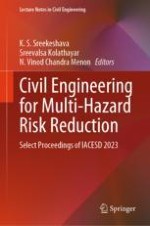2024 | OriginalPaper | Buchkapitel
Enhancing Flood Forecasting Accuracy Through Machine Learning Approaches
verfasst von : Halappanavar Ruta Shivarudrappa, S. P. Nandhini, T. S. Pushpa, K. P. Shailaja
Erschienen in: Civil Engineering for Multi-Hazard Risk Reduction
Verlag: Springer Nature Singapore
Aktivieren Sie unsere intelligente Suche, um passende Fachinhalte oder Patente zu finden.
Wählen Sie Textabschnitte aus um mit Künstlicher Intelligenz passenden Patente zu finden. powered by
Markieren Sie Textabschnitte, um KI-gestützt weitere passende Inhalte zu finden. powered by
